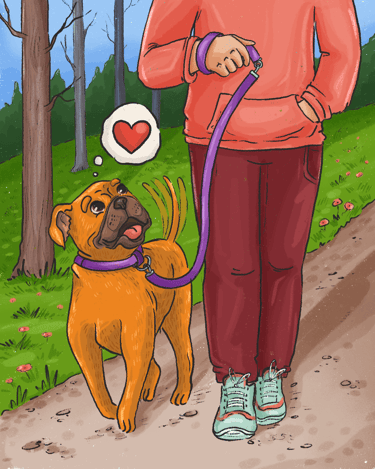My dog pulls on the lead
Walking your dog can either be one of the most enjoyable parts of your relationship or a chore you come to hate. This is where picking your dog's size appropriately will help. It's a lot easier to correct a dog that you can move. We are not anti big dog here but we are anti having a dog too big for YOU to safely keep under control in an emergency.
We need to look at why they are pulling.
Are they pulling because they are leading the walk, and are pulling you in the direction they want to go in? If so, we need to add in value when they are engaged with you as well as some leadership so rather than feel they have to lead the walk they look to you for guidance.
Are they pulling because they are engaged with another dog/person/squirrel? If so, the above still stands but we also need to go through our reactivity checks, as well as some impulse control.


A lot goes into this decision because only you will know your situation but we wrote a guide to help you on the best track to success in picking your new companion.
What dog should I pick?
This is something that is accepted as normal too often- that having a dog just means that your space is going to get chewed and destroyed to some degree, but that some dogs are better than others for it.
There are countless reasons why your dog may be being destructive, but they mostly boil down to two main root causes- fear and boredom.
Fear may sound extreme but what we really mean here is anxiety or stress. Separation anxiety is a good example of what we mean. If your dog gets stressed when you are apart, this may lead them to take that stress out with chewing. We counter this by adding value to spending time on a bed alone, as well as to appropriate chew toys. We have linked this exercise for you to look at in more detail.
The other reason is boredom. They are alone, they are bored and looking for something to do. This one is our fault though because we haven't set them up for success. If they are alone in a room they shouldn't be able to get to anything we don't want them to and they should have the option to have an appropriate chew. If we know it's going to be an extended period should we be putting them in their crate for safety?
My dog destroys things
My dog snaps at me/others
Snapping is a behaviour we can never accept. Little dogs usually get away with it more in the eyes of the general public than bigger dogs, but it doesn't matter the size of the dog- the risk of injury to you and others is still there.
As with any issue we have to first work out why they are snapping. What was happening when they snapped?
Was someone approaching them? If so, we need to think if there were any signs of fear beforehand that we could have picked up on and addressed. For example, were their ears pinned back? If your dog is showing signs of fear it's understandable to want to encourage them to face that fear. Instead, increase the distance slightly to whatever they are scared of and allow them a moment to decompress. Usually they will shake it out. Then, when they are being positive, mark that behaviour. You are showing them at you are understanding their needs for that situation to finish but by not completely leaving and letting them settle down you are leading them to see there is no danger if there was you wouldn't put them in that situation.
Was it that they had something, and they didn't want it to be taken away? This is more complicated- and with a rescue you have to be careful. They may have some trauma around being hit, or having their food/toys taken from them. We need to allow them time to know that they are safe and have enough to not need to fight for it, whilst also not feeding into the behaviour. In this situation we can get a toy or treat with higher value to trade them for the item they are guarding. Get their attention with it then place it somewhere else, preferably in their crate so we can then shut it, leading them with a house line if it's attached. This isn't a punishment, but it's a way to remove the toy they are guarding until they can enjoy it appropriately.
If you have a puppy, you can just lead them away with their house line to correct the behaviour, and use a time out so they understand that this isn't an acceptable way to communicate.
Coming soon




